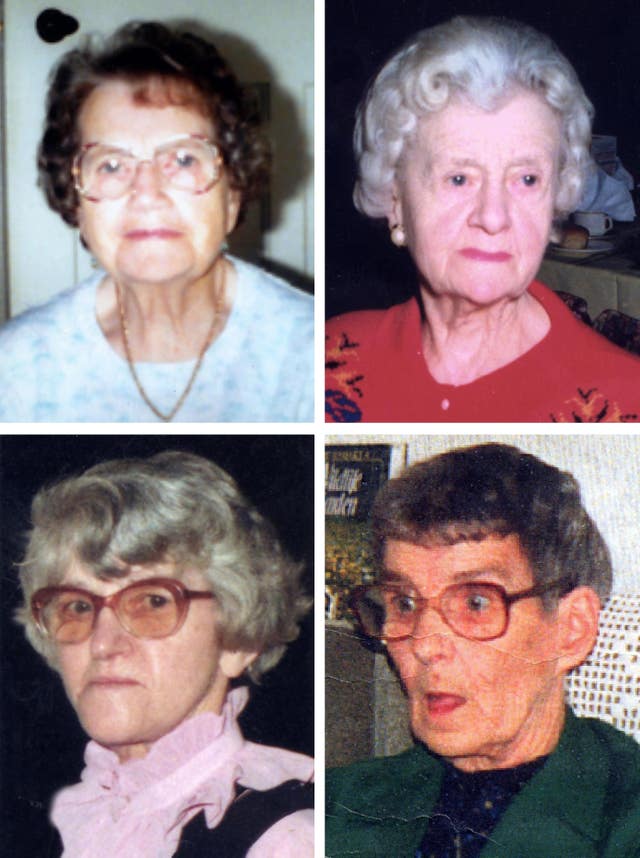
The murder convictions of a nurse who was jailed for life for murdering four patients and attempting to kill a fifth have been referred to the Court of Appeal.
Colin Norris, originally from Glasgow, was found guilty in 2008 by a majority of murdering four women and attempting to murder another by injecting them with insulin.
The 44-year-old was dubbed the "angel of death".
All five women, including Ethel Hall, Bridget Bourke, Doris Ludlam and Irene Crookes who died, were elderly inpatients on orthopaedic wards in Leeds where he worked as a nurse.
After reviewing the case, the Criminal Cases Review Commission (CCRC) has decided to refer all five convictions to the Court of Appeal.
It said: “The CCRC considered new expert evidence presented by Mr Norris’s representatives and instructed its own expert to provide a number of reports.
“This new expert evidence explored recent developments in a complex area where scientific understanding is still developing.
“As a result of the new expert evidence, the CCRC has concluded that there is a real possibility that the Court of Appeal will decide that Mr Norris’s conviction for the murder/attempted murder of one or more of the four patients is unsafe.”
 Norris was convicted in 2008 of killing Ethel Hall, Bridget Bourke, Doris Ludlam and Irene Crookes (West Yorkshire Police/PA)
Norris was convicted in 2008 of killing Ethel Hall, Bridget Bourke, Doris Ludlam and Irene Crookes (West Yorkshire Police/PA)
Norris – who was born in Glasgow – was found guilty of four counts of murder and a single count of attempted murder after a five-month trial at Newcastle Crown Court.
He was sentenced to life imprisonment with a minimum term of 30 years.
The case against him was wholly circumstantial and heavily reliant on expert opinion evidence on a number of complex medical and scientific issues.
Experts have now agreed that the hypoglycaemia in four of the women – other than Mrs Hall – may be accounted for by natural causes, according to the CCRC.
Mrs Hall developed severe hypoglycaemia while in hospital and died on December 11 2002 and the cause of her murder is not being questioned.
However, the CCRC considers this conviction depends on support from the other four cases and the prosecution’s assertion that no-one other than Norris could have been responsible.
The CCRC said new evidence also highlighted several other relevant developments in the understanding of hypoglycaemia, including its prevalence in the elderly and frail.
This has cast further doubt on the expert opinion relied upon by the prosecution at trial.
The statement added: “The CCRC considers that this conviction depends upon support from the other four cases and the prosecution’s assertion that no-one other than Mr Norris could have been responsible.
“In light of the new expert evidence, the CCRC is satisfied that this assertion is now less secure and that, as a result, there is a real possibility that the Court of Appeal will quash this conviction too.”



Why are you making commenting on The Herald only available to subscribers?
It should have been a safe space for informed debate, somewhere for readers to discuss issues around the biggest stories of the day, but all too often the below the line comments on most websites have become bogged down by off-topic discussions and abuse.
heraldscotland.com is tackling this problem by allowing only subscribers to comment.
We are doing this to improve the experience for our loyal readers and we believe it will reduce the ability of trolls and troublemakers, who occasionally find their way onto our site, to abuse our journalists and readers. We also hope it will help the comments section fulfil its promise as a part of Scotland's conversation with itself.
We are lucky at The Herald. We are read by an informed, educated readership who can add their knowledge and insights to our stories.
That is invaluable.
We are making the subscriber-only change to support our valued readers, who tell us they don't want the site cluttered up with irrelevant comments, untruths and abuse.
In the past, the journalist’s job was to collect and distribute information to the audience. Technology means that readers can shape a discussion. We look forward to hearing from you on heraldscotland.com
Comments & Moderation
Readers’ comments: You are personally liable for the content of any comments you upload to this website, so please act responsibly. We do not pre-moderate or monitor readers’ comments appearing on our websites, but we do post-moderate in response to complaints we receive or otherwise when a potential problem comes to our attention. You can make a complaint by using the ‘report this post’ link . We may then apply our discretion under the user terms to amend or delete comments.
Post moderation is undertaken full-time 9am-6pm on weekdays, and on a part-time basis outwith those hours.
Read the rules here